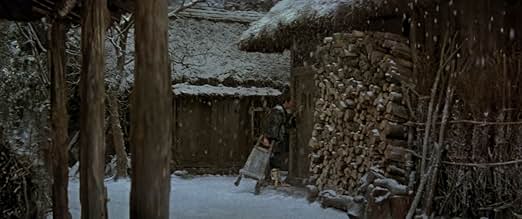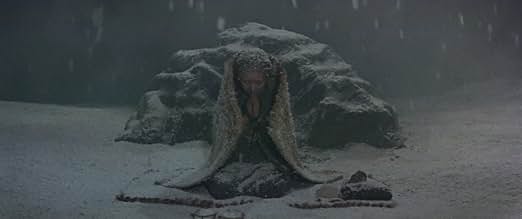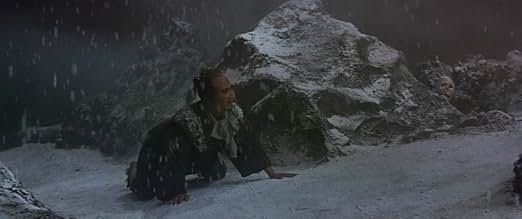IMDb RATING
7.8/10
4K
YOUR RATING
A kabuki theatre-inflected story about a poor village whose people have to be carried to a nearby mountain to die once they get old.A kabuki theatre-inflected story about a poor village whose people have to be carried to a nearby mountain to die once they get old.A kabuki theatre-inflected story about a poor village whose people have to be carried to a nearby mountain to die once they get old.
- Director
- Writers
- Stars
- Awards
- 6 wins & 1 nomination total
- Director
- Writers
- All cast & crew
- Production, box office & more at IMDbPro
Featured reviews
The Ballad of Narayama (1958)
Rating: (4/5)
Review: "The Ballad of Narayama" masterfully blends Kabuki theater with the golden age of Japanese cinema, delivering a powerful and moving experience. The film's fantastic sets and heartrending climax make it truly memorable.
At the heart of the story is Orin, an elderly woman who faces the traditional practice of being carried to Mount Narayama to die once she reaches the age of 70. Her character is portrayed with deep emotional resonance, capturing the strength and dignity with which she accepts her fate. Orin's son plays a crucial role in the narrative, as he struggles with the impending loss of his mother and the cultural expectations placed upon him. Their relationship adds a poignant layer to the film, highlighting themes of familial duty and love.
The performances are deeply emotional, and the direction is impeccable, capturing the cultural and historical essence of the story. This film is a testament to the enduring power of traditional Japanese storytelling.
At the heart of the story is Orin, an elderly woman who faces the traditional practice of being carried to Mount Narayama to die once she reaches the age of 70. Her character is portrayed with deep emotional resonance, capturing the strength and dignity with which she accepts her fate. Orin's son plays a crucial role in the narrative, as he struggles with the impending loss of his mother and the cultural expectations placed upon him. Their relationship adds a poignant layer to the film, highlighting themes of familial duty and love.
The performances are deeply emotional, and the direction is impeccable, capturing the cultural and historical essence of the story. This film is a testament to the enduring power of traditional Japanese storytelling.
This is the story of an old woman who according to customary tradition of the remote Japanese village where she lives, must be carried by his son to the top of the neighbouring Narayama mountain to meet the gods and die since she has reached 70 years of age. Behind this tradition who seems awful to our western minds, lies the fact that the community is too poor to be able to support its old people. But tradition doesn't always subjugate human feelings and if the old woman shows herself as resigned to her fate and even displays some joy in fulfilling the tradition rules, his son feels a deep sorrow in accomplishing that terrible duty and while doing it he must fight in his heart and mind to subdue those loving and compassionate feelings. The scene at the top of the mountain when he is carrying his mother and ends up by laying her on the ground where soon snow begins to fall is intensely tragic in its silence interrupted now and then by the outbursts of the powerless and extremely emotional son's revolt. All along the film we hear to the voice off of a commentator who narrates the story accompanied by a beautiful traditional Japanese music. This commentator's performance reminds us of the role of the chorus present in ancient Greek tragedies. The images make us think of the traditional Japanese paintings with their patches of neat colours making a somewhat theatrical scenery. This movie gives way to deep emotions although not exposed with our kind of western reactions but with Japanese type ones which doesn't make them appear less human.
Made available on Blu-ray by the Criterion Collection, Kinoshita's highly stylized exploration of the Narayama story is a deliciously stunning exploration of the possibilities of colour, and has some of the most inventive use of transition in film.
You might be familiar with the far more explicit and naturalistic film version of the same story from 1983, made by Shôhei Imamura, and knowledge of that film greatly enhanced my viewing of this. These two films are worlds apart, in fact so much that it feels that Imamura's film openly converses with this, since its theatricality seems to almost provoke the kind of hyper-naturalism inherent in the Imamura. Another film that enriches this is Kinugasa's "Jigokumon" ("Gates of Hell", 1953), available on Region B Blu-ray courtesy of the Masters of Cinema, and soon to be released by Criterion, as well.
I didn't know much of Kinoshita before this, only the biographical information concerning his relationship with Masaki Kobayashi, who served as his apprentice and whose film "Harakiri" (1962) Kinoshita openly disliked (he reversed his opinion later). I think it's somewhat ironic since Kobayashi's use of lighting certainly finds a compeer here, and I think this definitely encouraged "Kwaidan" (1964) to go to the lengths it did.
You might be familiar with the far more explicit and naturalistic film version of the same story from 1983, made by Shôhei Imamura, and knowledge of that film greatly enhanced my viewing of this. These two films are worlds apart, in fact so much that it feels that Imamura's film openly converses with this, since its theatricality seems to almost provoke the kind of hyper-naturalism inherent in the Imamura. Another film that enriches this is Kinugasa's "Jigokumon" ("Gates of Hell", 1953), available on Region B Blu-ray courtesy of the Masters of Cinema, and soon to be released by Criterion, as well.
I didn't know much of Kinoshita before this, only the biographical information concerning his relationship with Masaki Kobayashi, who served as his apprentice and whose film "Harakiri" (1962) Kinoshita openly disliked (he reversed his opinion later). I think it's somewhat ironic since Kobayashi's use of lighting certainly finds a compeer here, and I think this definitely encouraged "Kwaidan" (1964) to go to the lengths it did.
It gets a little tedious to relate current events to old movies so apologies dear reader, but while watching this film I couldn't help but think of the heartless voices in American politics that suggested old people sacrifice themselves for the good of the economy during the pandemic this year. It also made me think of Make Way for Tomorrow (1937) and Midsommar (2019), and maybe that's all you need to know (and then some).
Bless the little old lady at its center (Kinuyo Tanaka) - she's so sweet, and certainly contributes to the family by catching fish, hauling the harvest, and cooking, which makes her treatment even more heartbreaking. Whether the practice of obasute is legendary or not, it's easy to see a real-world parallel to how older people are too often forgotten, shoved aside, or abused, which may touch some painful chords in the viewer.
Here we see cruelty that is at times blunt (her annoying-as-hell grandson), ritualized (perhaps to help rationalize it), and in some sense born out of brutal economic need (food is a luxury, and making white rice once a year is a special treat). It all reflects losing our humanity with how we treat the elderly. The film lags a little bit in its last half hour, but it absolutely brims with emotion. The kabuki styling of the storytelling from director Keisuke Kinoshita is delightful, and made me think of our painful little lives as on the stage, each in one role today, and another tomorrow.
Bless the little old lady at its center (Kinuyo Tanaka) - she's so sweet, and certainly contributes to the family by catching fish, hauling the harvest, and cooking, which makes her treatment even more heartbreaking. Whether the practice of obasute is legendary or not, it's easy to see a real-world parallel to how older people are too often forgotten, shoved aside, or abused, which may touch some painful chords in the viewer.
Here we see cruelty that is at times blunt (her annoying-as-hell grandson), ritualized (perhaps to help rationalize it), and in some sense born out of brutal economic need (food is a luxury, and making white rice once a year is a special treat). It all reflects losing our humanity with how we treat the elderly. The film lags a little bit in its last half hour, but it absolutely brims with emotion. The kabuki styling of the storytelling from director Keisuke Kinoshita is delightful, and made me think of our painful little lives as on the stage, each in one role today, and another tomorrow.
In Kabuki style, the film tells the story of a remote mountain village where the scarcity of food leads to a voluntary but socially-enforced policy in which relatives carry 70-year-old family members up Narayama mountain to die.
Roger Ebert of the Chicago Sun-Times rated the film a maximum 4 stars, and added it to his Great Movies list in 2013, making it the final film he added to the list before his death. In a June 1961 review in The New York Times, A.H. Weiler called the film "an odd and colorful evocation of Japan's past that is only occasionally striking"; "It is stylized and occasionally graphic fare in the manner of the Kabuki Theatre, which is realistically staged, but decidedly strange to Western tastes." I have to respectfully disagree with Weiler. Perhaps at the time the film was strange to Western taste. I couldn't speak to that. But I find it quite refreshing, and really enjoy how they made it obvious that the story was told on a stage. Rather than hide the stag as American films do, this one embraces it, so you know you are really watching a story and it need not be any more than that. And yet, it is not just theater but a bigger experience.
Roger Ebert of the Chicago Sun-Times rated the film a maximum 4 stars, and added it to his Great Movies list in 2013, making it the final film he added to the list before his death. In a June 1961 review in The New York Times, A.H. Weiler called the film "an odd and colorful evocation of Japan's past that is only occasionally striking"; "It is stylized and occasionally graphic fare in the manner of the Kabuki Theatre, which is realistically staged, but decidedly strange to Western tastes." I have to respectfully disagree with Weiler. Perhaps at the time the film was strange to Western taste. I couldn't speak to that. But I find it quite refreshing, and really enjoy how they made it obvious that the story was told on a stage. Rather than hide the stag as American films do, this one embraces it, so you know you are really watching a story and it need not be any more than that. And yet, it is not just theater but a bigger experience.
Did you know
- TriviaThis was the final film to be added to Roger Ebert's list of "Great Movies" before his death on April 4, 2013 at the age of 70.
- ConnectionsFeatured in Tvennesnack: Varför kan vi inte komma ihåg den här jävla filmen? (2022)
- How long is The Ballad of Narayama?Powered by Alexa
Details
- Release date
- Country of origin
- Language
- Also known as
- Ballad of Narayama
- Filming locations
- Production company
- See more company credits at IMDbPro
Contribute to this page
Suggest an edit or add missing content





























